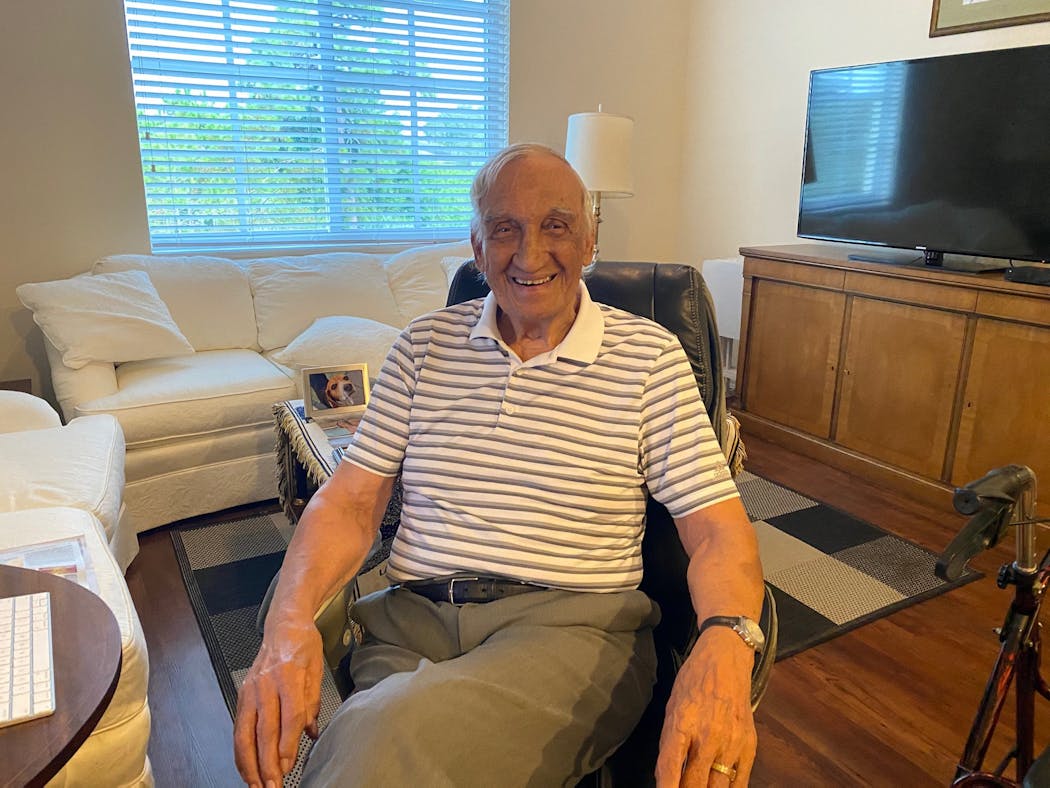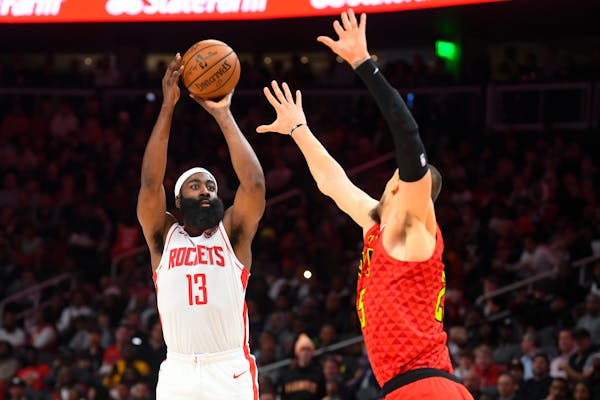What sports fan hasn't dreamed of being buddies with one of their idols? Having a beer with Kent Hrbek, talking football with Randy Moss.
For one Minnesota fan, that dream came true — 70 years later.
After a lifetime as a professional photographer, John Peterson discovered a trove of photos last year in the basement of his Hibbing home. They were pictures he'd taken of the Minneapolis Lakers when he was a teenager in the early 1950s, photographs forgotten and unseen for nearly seven decades.
After a news story about his discovery, Peterson wound up connecting with Bob Harrison, one of three players still living from the NBA's first dynasty.
Now, a year later, the 82-year-old Peterson and the 93-year-old Harrison are pals, talking on the phone every couple of weeks about life and rehashing basketball moments they shared a lifetime ago, when Harrison was an NBA All-Star and Peterson was a star-struck kid sitting courtside with a camera.
Both widowers, both quarantined by the coronavirus, the pair have bonded in their isolation and are having a wonderful time reliving the glory days when Minneapolis was the center of the pro basketball world.
"It makes me feel good to think about those things," Harrison said on a recent call with Peterson. "If you've got good memories, you can survive."
Now residing in an assisted-living facility in Florida, Harrison is cut off from the world as visitors have been barred from his home.
"I'm in my room 24 hours a day," he said. "It's so nice to have somebody to talk to who shares some of those experiences.
"I didn't think there was anybody alive who saw me play," he added with a laugh.
For Peterson, the friendship with Harrison "makes my day every time I talk to him. Right now, because of this virus thing, I have nothing to do but sit in my chair, so I've been calling him more often."
Opportunity knocks
Their shared experience began when the 13-year-old Peterson arrived at the old Minneapolis Auditorium with his grandfather one night in late 1950. Already a devoted shutterbug, Peterson brought his camera to the game and was bold enough to knock on the Lakers' locker room door to see if he could take some pictures of the players.
His knock was answered by a friendly young man who threw his arm around Peterson's shoulders, dubbed him "Petey" and invited him in. It was Harrison, then in his second year out of the University of Michigan and already possessor of an NBA championship ring, one of three he'd win with the legendary team.
The Lakers rolled out a star-studded lineup featuring Hall of Famers George Mikan, Jim Pollard and Vern Mikkelsen. Harrison, nicknamed "Tiger," was a guard whose job was to play great defense and get the ball to the powerful trio of front-liners.
The team adopted Petey, welcoming him — and his camera — at courtside and in the locker room for dozens of games over the next few seasons. He'd hang around the team's office on Nicollet Avenue in downtown Minneapolis, and players passing through would take him out for a hamburger and a milkshake.
It was that experience, Peterson says now, that set him on the path to the professional photography career that he followed for more than 60 years.
"That Laker experience kind of hit it all," Peterson said. "The more pictures I took, the more I got into my chosen profession. Without [Harrison] opening that door, who knows what would have happened?"
Harrison, Arnie Ferrin and Bud Grant are the only living players from those early Lakers teams. Grant, 93, played for two years with the Lakers and won one championship. Ferrin, 95, played for three years and won two titles. That leaves Harrison, with nearly five seasons and three rings, as the longest-tenured and most-decorated player from those teams.
Dynasty highlights
In their calls, Peterson and Harrison relive the memorable games during the Lakers' title runs and talk about players of the early NBA, both on the Lakers and on other teams.
Perhaps Harrison's best moment came in the 1950 NBA Finals against the Syracuse Nationals, when he won the first game with a last-second, 40-foot shot that's the first buzzer-beater in NBA Finals history. He and Peterson have dissected that play many times.
"They threw the ball to me. I dribbled down the left side and I was about one step over the center line and the damn ball went in. It was a miracle shot," Harrison said, laughing as he recalled the moment. "That was one of the highlights in my career."
Harrison was there for many memorable moments in NBA history. One came in 1949, his rookie season. Mikan was so dominant that when the team arrived in New York to play the Knicks, the marquee at Madison Square Garden read simply, "Geo. Mikan vs. Knicks."
That night, Harrison said, the team pranked Mikan by refusing to take the floor.
"When we got our uniforms on and it was time to go out, we all just sat there," he said, laughing again. "It was our way of saying, 'Well, go ahead, George.' We were all in on the joke, and George took it well. He laughed about it."
Harrison is full of praise for John Kundla, coach of the dynasty.
"He was a real gentleman," Harrison said. "He never raised hell with us, never cussed us out. And I don't think he got enough credit. Everybody would say, 'I could have won the championship with Mikkelsen, Pollard and Mikan,' and that's not true."
Those Lakers teams stuck together on and off the court, Harrison said. Most of the players lived in the Twin Cities year-round, and they were generous about giving time and attention to fans and children.
"I've never seen a team like we had, that liked each other so much and did things in the offseason together," Harrison said.
Another Lakers legend was Sid Hartman, who served as a team executive while also covering them as a sportswriter for the Minneapolis Tribune. Harrison asked if Hartman was still around.
Told that Hartman, at age 100, still writes a regular column several times a week for the Star Tribune, Harrison chuckled.
"Well, I'll be damned," he said.
After an hourlong conversation, it's time for lunch, and the two friends say goodbye.
"I'll give you a call again soon, Bobby," Peterson says as he ends the call. "You're my hero."

Seven reasons this could be the season fans pay closer attention to Minnesota United
Will Power denies participating in Penske cheating scandal. Silence from Josef Newgarden
Cubs reliever Luke Little forced to change his glove because of white in American flag patch
Kentucky appeals court denies Bob Baffert-trained Arkansas Derby winner Muth to enter Kentucky Derby



